Editor’s note: The following short story was published in Galaxy Science Fiction (July 1953).
When Three did not answer, Rossel was nervously gazing at the snow, thinking of other things, and he called again. Several moments later the realization of what was happening struck him like a blow. Three had never once failed to answer. All they had to do when they heard the signal buzz was go into the radio shack and say hello. That was all they had to do. He called again and again, but nobody answered. There was no static and no interference and he didn’t hear a thing. He checked frenziedly through his own apparatus and tried again, but the air was as dead as deep space. He raced out to tell Dylan.
Dylan accepted it. He had known none of the people on Three and what he felt now was a much greater urgency to be out of here. He said hopeful things to Rossel, and then went out to the ship and joined the men in lightening her. About the ship at least, he knew something and he was able to tell them what partitions and frames could go and what would have to stay or the ship would never get off the planet. But even stripped down, it couldn’t take them all. When he knew that, he realized that he himself would have to stay here, for it was only then that he thought of Bossio.

Three was dead. Bossio had gone down there some time ago and, if Three was dead and Bossio had not called, then the fact was that Bossio was gone too. For a long, long moment Dylan stood rooted in the snow. More than the fact that he would have to stay here was the unspoken, unalterable, heart-numbing knowledge that Bossio was dead—the one thing that Dylan could not accept. Bossio was the only friend he had. In all this dog-eared, aimless, ape-run Universe Bossio was all his friendship and his trust.
He left the ship blindly and went back to the settlement. Now the people were quiet and really frightened, and some of the women were beginning to cry. He noticed now that they had begun to look at him with hope as he passed, and in his own grief, humanly, he swore.
Bossio—a big-grinning kid with no parents, no enemies, no grudges—Bossio was already dead because he had come out here and tried to help these people. People who had kicked or ignored him all the days of his life. And, in a short while, Dylan would also stay behind and die to save the life of somebody he never knew and who, twenty-four hours earlier, would have been ashamed to be found in his company. Now, when it was far, far too late, they were coming to the army for help.
______________________________________________________________________________
But in the end, damn it, he could not hate these people. All they had ever wanted was peace, and even though they had never understood that the Universe is unknowable and that you must always have big shoulders, still they had always sought only for peace. If peace leads to no conflict at all and then decay, well, that was something that had to be learned. So he could not hate these people.
But he could not help them either. He turned from their eyes and went into the radio shack. It had begun to dawn on the women that they might be leaving without their husbands or sons, and he did not want to see the fierce struggle that he was sure would take place. He sat alone and tried, for the last time, to call Bossio.
After a while, an old woman found him and offered him coffee. It was a very decent thing to do, to think of him at a time like this, and he was so suddenly grateful he could only nod. The woman said that he must be cold in that thin army thing and that she had brought along a mackinaw for him. She poured the coffee and left him alone.
They were thinking of him now, he knew, because they were thinking of everyone who had to stay. Throw the dog a bone. Dammit, don’t be like that, he told himself. He had not had anything to eat all day and the coffee was warm and strong. He decided he might be of some help at the ship.
It was stripped down now and they were loading. He was startled to see a great group of them standing in the snow, removing their clothes. Then he understood. The clothes of forty people would change the weight by enough to get a few more aboard. There was no fighting. Some of the women were almost hysterical and a few had refused to go and were still in their cabins, but the process was orderly. Children went automatically, as did the youngest husbands and all the women. The elders were shuffling around in the snow, waving their arms to keep themselves warm. Some of them were laughing to keep their spirits up.
In the end, the ship took forty-six people.
Rossel was one of the ones that would not be going. Dylan saw him standing by the airlock holding his wife in his arms, his face buried in her soft brown hair. A sense of great sympathy, totally unexpected, rose up in Dylan, and a little of the lostness of thirty years went slipping away. These were his people. It was a thing he had never understood before, because he had never once been among men in great trouble. He waited and watched, learning, trying to digest this while there was still time. Then the semi-naked colonists were inside and the airlock closed. But when the ship tried to lift, there was a sharp burning smell—she couldn’t get off the ground.
______________________________________________________________________________
Rush was sitting hunched over in the snow, his rifle across his knees. He was coated a thick white and if he hadn’t spoken Dylan would have stumbled over him. Dylan took out his pistol and sat down.
“What happened?” Rush asked.
“Lining burned out. She’s being repaired.”
“Coincidence?”
Dylan shook his head.
“How long’ll it take to fix?”
“Four—five hours.”
“It’ll be night by then.” Rush paused. “I wonder.”
“Seems like they want to wait ’til dark.”
“That’s what I was figurin’. Could be they ain’t got much of a force.”
Dylan shrugged. “Also could mean they see better at night. Also could mean they move slow. Also could mean they want the least number of casualties.”
Rush was quiet and the snow fell softly on his face, on his eyebrows, where it had begun to gather. At length he said, “You got any idea how they got to the ship?”
Dylan shook his head again. “Nobody saw anything—but they were all pretty busy. Your theory about it maybe being one of us is beginning to look pretty good.”
The colonist took off his gloves, lit a cigarette. The flame was strong and piercing and Dylan moved to check him, but stopped. It didn’t make much difference. The aliens knew where they were.
And this is right where we’re gonna be, he thought.
“You know,” he said suddenly, speaking mostly to himself, “I been in the army thirty years, and this is the first time I was ever in a fight. Once in a while we used to chase smugglers—never caught any, their ships were new—used to cut out after unlicensed ships, used to do all kinds of piddling things like that. But I never shot at anybody.”
Rush was looking off into the woods. “Maybe the mail ship will come in.”
Dylan nodded.
“They got a franchise, dammit. They got to deliver as long as they’s a colony here.”
When Dylan didn’t answer, he said almost appealingly: “Some of those guys would walk barefoot through hell for a buck.”
“Maybe,” Dylan said. After all, why not let him hope? There were four long hours left.
______________________________________________________________________________
Now he began to look down into himself, curiously, because he himself was utterly without hope and yet he was no longer really afraid. It was a surprising thing when you looked at it coldly, and he guessed that, after all, it was because of the thirty years. A part of him had waited for this. Some crazy part of him was ready—even after all this time—even excited about being in a fight. Well, what the hell, he marveled. And then he realized that the rest of him was awakening too, and he saw that this job was really his … that he had always been, in truth, a soldier.
Dylan sat, finding himself in the snow. Once long ago he had read about some fool who didn’t want to die in bed, old and feeble. This character wanted to reach the height of his powers and then explode in a grand way—”in Technicolor,” the man had said. Explode in Technicolor. It was meant to be funny, of course, but he had always remembered it, and he realized now that that was a small part of what he was feeling. The rest of it was that he was a soldier.
Barbarian, said a small voice, primitive. But he couldn’t listen.
“Say, Cap,” Rush was saying, “it’s getting a mite chilly. I understand you got a bottle.”
“Sure,” he said cheerfully, “near forgot it.” He pulled it out and gave it to Rush. The colonist broke the seal and drank, saying to Dylan half-seriously, half-humorously: “One for the road.”
Beneath them the planet revolved and the night came on. They waited, speaking briefly, while the unseen sun went down. And faintly, dimly through the snow, they heard at last the muffled beating of a ship. It passed overhead and they were sighting their guns before they recognized it. It was the mailship.
They listened while she settled in a field by the camp, and Rush was pounding Dylan’s arm. “She will take us all,” Rush was shouting, “she’ll take us all,” and Dylan too was grinning, and then he saw a thing.
______________________________________________________________________________
Small and shadowy, white-coated and almost invisible, the thing had come out of the woods and was moving toward them, bobbing and shuffling in the silent snow.
______________________________________________________________________________
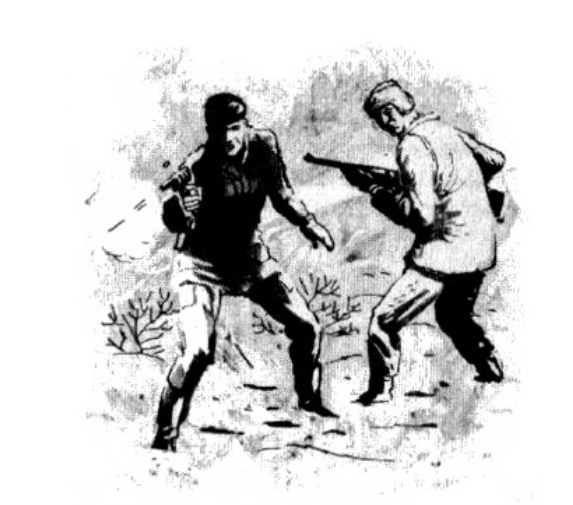
Dylan fired instinctively, because the thing had four arms and was coming right at him. He fired again. This time he hit it and the thing fell, but almost immediately it was up and lurching rapidly back into the trees. It was gone before Dylan could fire again.
______________________________________________________________________________
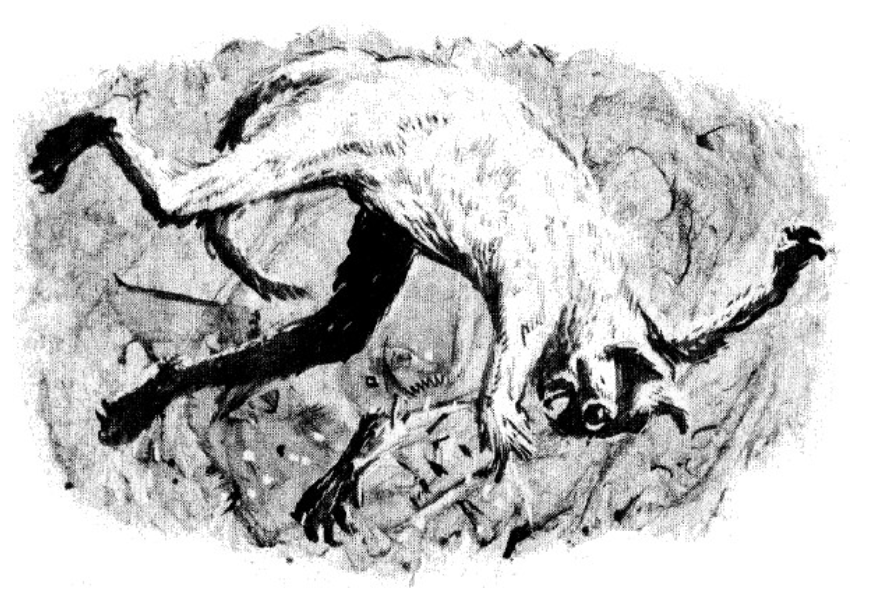
________________________________________________________________________________
They both lay flat in the snow, half-buried. From the camp there were now no sounds at all. For the first time today Dylan could hear the snow fall.
“Did you get a good look?”
Rush grunted, relaxing. “Should’ve saved your fire, son. Looked like one o’ them monkeys.”
But there was something wrong. There was something that Dylan had heard in the quickness of the moment which he could not remember but which was very wrong.
“Listen,” he said, suddenly placing it. “Dammit, that was no monkey.”
“Easy—”
“I hit it. I hit it cold. It made a noise.”
Rush was staring at him.
“Didn’t you hear?” Dylan cried.
“No. Your gun was by my ear.”
And then Dylan was up and running, hunched over, across the snow to where the thing had fallen. He had seen a piece of it break off when the bolt struck, and now in the snow he picked up a paw and brought it back to Rush. He saw right away there was no blood. The skin was real and furry all right but there was no blood. Because the bone was steel and the muscles were springs and the thing had been a robot.
______________________________________________________________________________
The Alien rose up from his cot, whistling with annoyance. When that ship had come in, his attention had been distracted from one of the robots, and of course the miserable thing had gone blundering right out into the humans. He thought for a while that the humans would overlook it—the seeing was poor and they undoubtedly would still think of it as animal, even with its firing ports open—but then he checked the robot and saw that a piece was missing and knew that the humans had found it. Well, he thought unhappily, flowing into his suit, no chance now to disable that other ship. The humans would never let another animal near.
And therefore—for he was, above all, a flexible being—he would proceed to another plan. The settlement would have to be detonated. And for that he would have to leave his own shelter and go out in that miserable cold and lie down in one of his bunkers which was much farther away. No need to risk blowing himself up with his own bombs, but still, that awful cold.
He dismissed his regrets and buckled his suit into place. It carried him up the stairs and bore him out into the snow. After one whiff of the cold, he snapped his viewplate shut and immediately, as he had expected, it began to film with snow. Well, no matter, he would guide the unit by coordinates and it would find the bunker itself. No need for caution now. The plan was nearly ended.
In spite of his recent setback, the Alien lay back and allowed himself the satisfaction of a full tremble. The plan had worked very nearly to perfection, as of course it should, and he delighted in the contemplation of it.
______________________________________________________________________________
When the humans were first detected, in the region of Boötes, much thought had gone into the proper method of learning their technology without being discovered themselves. There was little purpose in destroying the humans without first learning from them. Life was really a remarkable thing—one never knew what critical secrets a star-borne race possessed. Hence the robots. And it was an extraordinary plan, an elegant plan. The Alien trembled again.
The humans were moving outward toward the Rim, their base was apparently somewhere beyond Centaurus. Therefore, a ring of defense was thrown up on most of the habitable worlds toward which the humans were coming—oh, a delightful plan—and the humans came down one by one and never realized that there was any defense at all.
With a cleverness which was almost excruciating, the Aliens had carefully selected a number of animals native to each world, and then constructed robot duplicates. So simple then to place the robots down on a world with a single Director, then wait … for the humans to inhabit. Naturally the humans screened all the animals and scouted a planet pretty thoroughly before they set up a colony. Naturally their snares and their hunters caught no robots, and never found the deep-buried Alien Director.
Then the humans relaxed and began to make homes, never realizing that in among the animals which gamboled playfully in the trees there was one which did not gambol, but watched. Never once noticing the monkey-like animals or the small thing like a rabbit which was a camera eye, or the thing like a rat which took chemical samples, or the thing like a lizard which cut wires.
The Alien rumbled on through the snow, trembling so much now with ecstasy and anticipation that the suit which bore him almost lost its balance. He very nearly fell over before he stopped trembling, and then he contained himself. In a little while, a very little while, there would be time enough for trembling.
______________________________________________________________________________
“They could’ve been here ’til the sun went out,” Rush said, “and we never would’ve known.”
“I wonder how much they’ve found out,” Dylan said.
Rush was holding the paw.
“Pretty near everything, I guess. This stuff don’t stop at monkeys. Could be any size, any kind … look, let’s get down into camp and tell ’em.”
Dylan rose slowly to a kneeling position, peering dazedly out into the far white trees. His mind was turning over and over, around and around, like a roulette wheel. But, at the center of his mind, there was one thought, and it was rising up slowly now, through the waste and waiting of the years. He felt a vague surprise.
“Gettin’ kind of dark,” he said.
Rush swore. “Let’s go. Let’s get out of here.” He tugged once at Dylan’s arm and started off on his knees.
Dylan said: “Wait.”
Rush stopped. Through the snow he tried to see Dylan’s eyes. The soldier was still looking into the woods.
Dylan’s voice was halting and almost inaudible. “They know everything about us. We don’t know anything about them. They’re probably sittin’ out there right now, a swarm of ’em there behind those trees, waitin’ for it to get real nice and dark.”
He paused. “If I could get just one.”
It was totally unexpected, to Dylan as well as Rush. The time for this sort of thing was past, the age was done, and for a long while neither of them fully understood.
“C’mon,” Rush said with exasperation.
Dylan shook his head, marveling at himself. “I’ll be with you in a little while.”
Rush came near and looked questioningly into his face.
“Listen,” Dylan said hurriedly, “we only need one. If we could just get one back to a lab we’d at least have some clue to what they are. This way we don’t know anything. We can’t just cut and run.” He struggled with the unfamiliar, time-lost words. “We got to make a stand.”
______________________________________________________________________________
He turned from Rush and lay forward on his belly in the snow. He could feel his heart beating against the soft white cushion beneath him. There was no time to look at this calmly and he was glad of that. He spent some time being very much afraid of the unknown things beyond the trees, but even then he realized that this was the one thing in his life he had to do.
It is not a matter of dying, he thought, but of doing. Sooner or later a man must do a thing which justifies his life, or the life is not worth living. The long cold line of his existence had reached this point, here and now in the snow at this moment. He would go on from here as a man … or not at all.
Rush had sat down beside him, beginning to understand, watching without words. He was an old man. Like all Earthmen, he had never fought with his hands. He had not fought the land, or the tides, or the weather, or any of the million bitter sicknesses which Man had grown up fighting, and he was beginning to realize that somewhere along the line he had been betrayed. Now, with a dead paw of the enemy in his hand, he did not feel like a man. And he was ready to fight now, but it was much too late and he saw with a vast leaden shame that he did not know how, could not even begin.
“Can I help?” he said.
Dylan shook his head. “Go back and let them know about the robots, and, if the ship is ready to leave before I get back, well—then good luck.”
He started to slither forward on his belly but Rush reached out and grabbed him, holding with one hand to peace and gentleness and the soft days which were ending.
“Listen,” he said, “you don’t owe anybody.”
Dylan stared at him with surprise. “I know,” he said, and then he slipped up over the mound before him and headed for the trees.
______________________________________________________________________________
Now what he needed was luck. Just good, plain old luck. He didn’t know where they were or how many there were or what kinds there were, and the chances were good that one of them was watching him right now. Well, then he needed some luck. He inched forward slowly, carefully, watching the oncoming line of trees. The snow was falling on him in big, leafy flakes and that was fine, because the blackness of his suit was much too distinct and the more white he was the better. Even so, it was becoming quite dark by now and he thought he had a chance. He reached the first tree.
Silently he slipped off his heavy cap. The visor got in his way and above all he must be able to see. He let the snow thicken on his hair before he raised himself on his elbows and looked outward.
There was nothing but the snow and the dead quiet and the stark white boles of the trees. He slid past the first trunk to the next, moving forward on his elbows with his pistol in his right hand. His elbow struck a rock and it hurt and his face was freezing. Once he rubbed snow from his eyebrows. Then he came through the trees and lay down before a slight rise, thinking.
Better to go around than over. But if anything is watching, it is most likely watching from above.
Therefore, go around and come back up from behind. Yes.
His nose had begun to run. With great care he crawled among some large rocks, hoping against hope that he would not sneeze. Why had nothing seen him? Was something following him now? He turned to look behind him but it was darker now and becoming difficult to see. But he would have to look behind him more often.
He was moving down a gorge. There were large trees above him and he needed their shelter, but he could not risk slipping down the sides of the gorge. And far off, weakly, out of the gray cold ahead, he heard a noise.
He lay face down in the snow, listening. With a slow, thick shuffle, a thing was moving through the trees before him. In a moment he saw that it was not coming toward him. He lifted his head but saw nothing. Much more slowly now, he crawled again. The thing was moving down the left side of the gorge ahead, coming away from the rise he had circled. It was moving without caution and he worried that if he did not hurry, he would lose it. But for the life of him he couldn’t stand up.
______________________________________________________________________________
The soldier went forward on his hands and knees. When his clothes hung down, the freezing cold entered his throat and shocked his body, which was sweating. He shifted his gun to his gloved hand and blew on the bare fingers of his right, still crawling. When he reached the other end of the gorge, he stood upright against a rock wall and looked in the direction of the shuffling thing.
He saw it just as it turned. It was a great black lump on a platform. The platform had legs and the thing was plodding methodically upon a path which would bring it past him. It had come down from the rise and was rounding the gorge when Dylan saw it. It did not see him.
If he had not ducked quickly and brought up his gun, the monkey would not have seen him either, but there was no time for regret. The monkey was several yards to the right of the lump on the platform when he heard it start running, and he had to look up this time and saw it leaping toward him over the snow.
All right, he said to himself. His first shot took the monkey in the head, where the eyes were. As the thing crashed over, there was a hiss and a stench, and flame seared into his shoulder and the side of his face. He lurched to the side, trying to see, his gun at arm’s-length as the lump on the platform spun toward him. He fired four times. Three bolts went home in the lump, the fourth tore a leg off the platform and the whole thing fell over.
Dylan crawled painfully behind a rock, his left arm useless. The silence had come back again and he waited, but neither of the alien things moved. Nothing else moved in the woods around him. He turned his face up to the falling snow and let it come soothingly upon the awful wound in his side.
After a while he looked out at the monkey. It had risen to a sitting position but was frozen in the motion of rising. It had ceased to function when he hit the lump. Out of the numbness and the pain, he felt a great gladness rising.
The guide. He had killed the guide.
______________________________________________________________________________
He would not be cautious any more. Maybe some of the other robots were self-directing and dangerous, but they could be handled. He went to the lump, stared at it without feeling. A black doughy bulge was swelling out through one of the holes.
It was too big to carry, but he would have to take something back. He went over and took the monkey by a stiff jutting arm and began dragging it back toward the village.
Now he began to stumble. It was dark and he was very tired. But the steel he had been forging in his breast was complete, and the days which were coming would be days full of living. He would walk with big shoulders and he would not bother to question, because Man was not born to live out his days at home, by the fire.
It was a very big thing that Dylan had learned and he could not express it, but he knew it all the same, knew it beyond understanding. And so he went home to his people.
One by one, increasing, in the wee black corner of space which Man had taken for his own, other men were learning. And the snow fell and the planets whirled, and, when it was spring where Dylan had fought, men were already leaping back out to the stars.
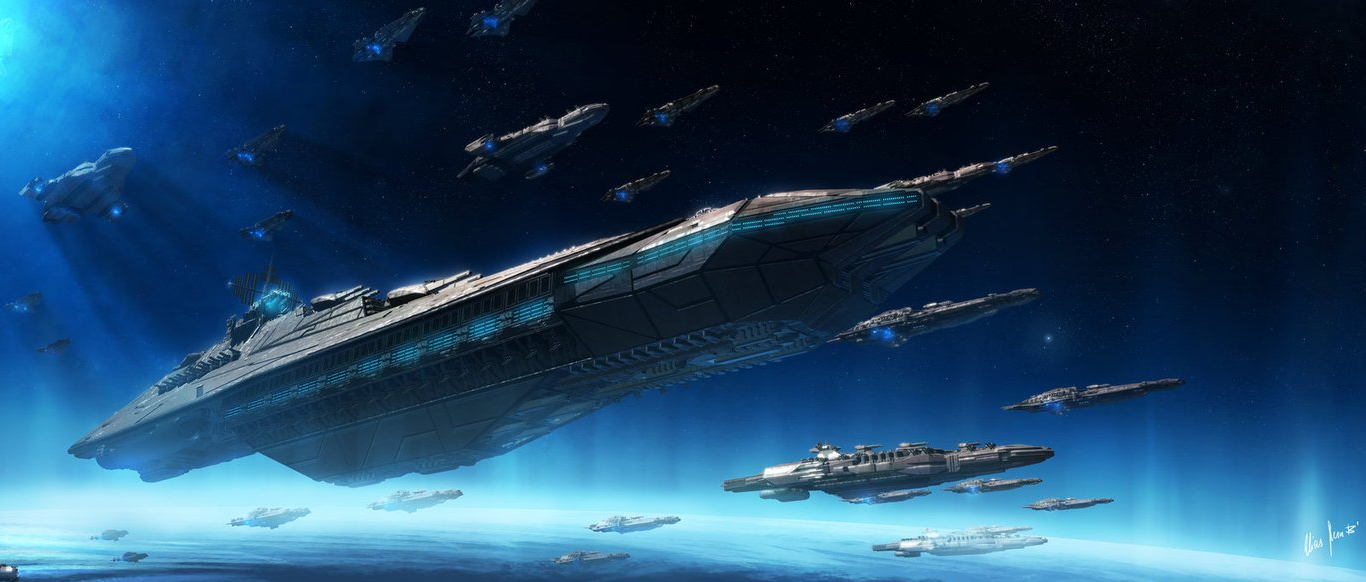

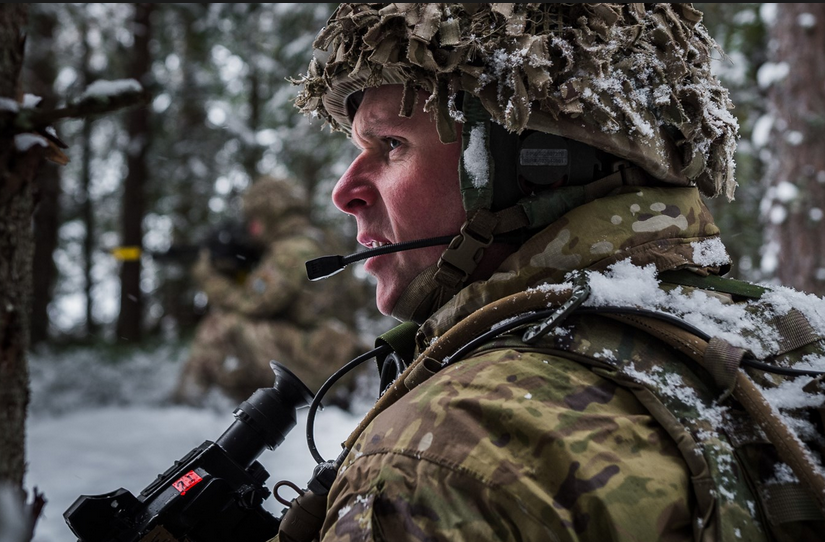


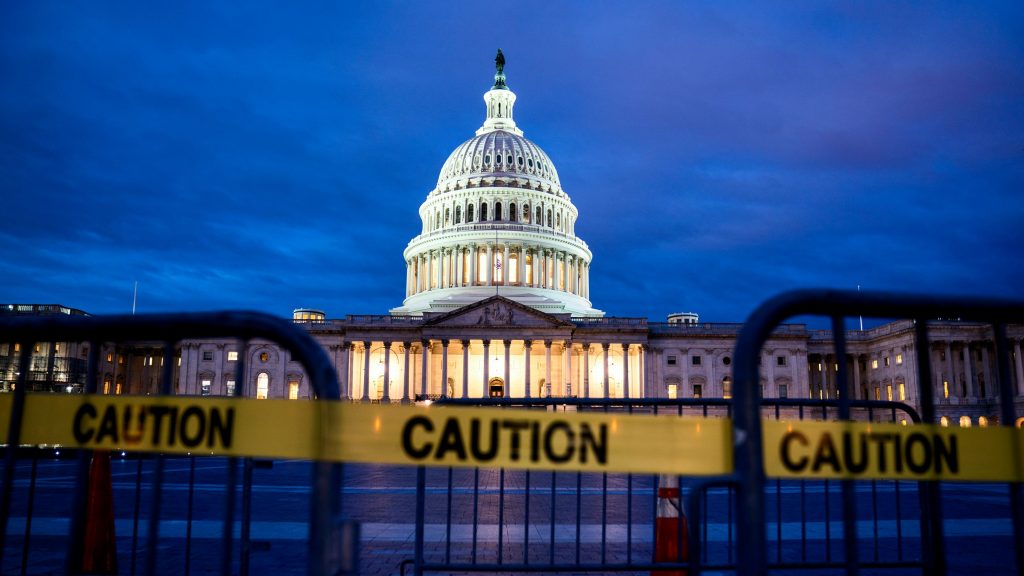





Excellent story. I’ve been a fan of the 1950’s science fiction for years. Back then science fact was still fiction and theory and writers actually had to write without a readily available fallback of “space phrases” from 40 years of sci-fi blockbuster films to make up for a lack of creative ability.
Solidly written Fifties science fiction hardly seems dated. And this story still resonates, particularly because of its central theme: a civilization grown soft from generations of peace suddenly coming under attack, and finding that it no longer knows how to fight. Back in 1953 the obvious analogy was to Pearl Harbor and the American defeats immediately following it. Today we can draw a parallel with the Third World migrant invasions of the West.
hrm. i wasn’t aware of Shaara’s scifi work.
obviously, “The Killer Angels” should be required reading.
5